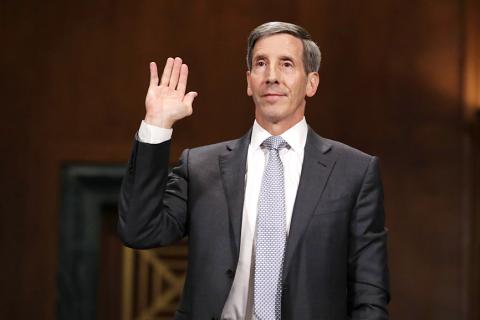Leading privacy watchdog groups lashed out at the US Federal Trade Commission (FTC) for siding with the advertising industry as part of a government initiative to update consumer-data protections.
The organizations — which include the Consumer Federation of America and the Electronic Frontier Foundation — on Monday told FTC Chairman Joe Simons in a letter that the agency relied on a “self-serving study” by the ad industry to warn against a policy in which consumers are opted out of online advertising by default.
“Instead of squarely defending the privacy rights of consumers it really capitulates to a pro-industry position using industry research,” said Jeff Chester, executive director of the Center for Digital Democracy, which joined the letter. “It removes what little credibility the FTC under Chairman Simons has.”

Photo: AFP
The FTC should be replaced as the agency responsible for protecting consumer privacy, Chester said.
“They’re incapable of standing up for the public and taking on these powerful interests,” he said. “We need a real watchdog, not a lapdog.”
Simons has vowed to make privacy and data security an enforcement priority and has called for legislation that would expand the agency’s authority.
Simons is leading the commission as it investigates Facebook Inc for possibly violating a privacy order imposed in 2011.
The FTC did not respond to a request for comment about the privacy groups’ criticism.
Early this month, the FTC submitted a comment to an arm of the US Department of Commerce as part of an initiative by US President Donald Trump’s administration to gather public input on ways to protect consumer privacy and data online.
The agency said giving consumers control over collection and use of their data online could be beneficial, but could also be costly to implement and might have “unintended consequences.”
“For example, if consumers were opted out of online advertisements by default [with the choice of opting in], the likely result would include the loss of advertising-funded online content,” the FTC said.
That comment drew the ire of the privacy watchdog groups because, they say, the FTC based it on a survey commissioned by the Digital Advertising Alliance, which is made up of advertising associations.
Participating companies include some of the world’s biggest companies, such as Amazon.com Inc, Alphabet Inc’s Google, General Motors Co and Walmart Inc.
“As federal privacy legislation is contemplated, the FTC should be a strong voice for advancing Americans’ privacy interests in a meaningful way, not parroting the advertising industry’s talking points,” said Susan Grant, director of consumer protection and privacy at the Consumer Federation of America.
A spokesman for the Digital Advertising Alliance declined to immediately comment.

POWERING UP: PSUs for AI servers made up about 50% of Delta’s total server PSU revenue during the first three quarters of last year, the company said Power supply and electronic components maker Delta Electronics Inc (台達電) reported record-high revenue of NT$161.61 billion (US$5.11 billion) for last quarter and said it remains positive about this quarter. Last quarter’s figure was up 7.6 percent from the previous quarter and 41.51 percent higher than a year earlier, and largely in line with Yuanta Securities Investment Consulting Co’s (元大投顧) forecast of NT$160 billion. Delta’s annual revenue last year rose 31.76 percent year-on-year to NT$554.89 billion, also a record high for the company. Its strong performance reflected continued demand for high-performance power solutions and advanced liquid-cooling products used in artificial intelligence (AI) data centers,

SIZE MATTERS: TSMC started phasing out 8-inch wafer production last year, while Samsung is more aggressively retiring 8-inch capacity, TrendForce said Chipmakers are expected to raise prices of 8-inch wafers by up to 20 percent this year on concern over supply constraints as major contract chipmakers Taiwan Semiconductor Manufacturing Co (TSMC, 台積電) and Samsung Electronics Co gradually retire less advanced wafer capacity, TrendForce Corp (集邦科技) said yesterday. It is the first significant across-the-board price hike since a global semiconductor correction in 2023, the Taipei-based market researcher said in a report. Global 8-inch wafer capacity slid 0.3 percent year-on-year last year, although 8-inch wafer prices still hovered at relatively stable levels throughout the year, TrendForce said. The downward trend is expected to continue this year,

Vincent Wei led fellow Singaporean farmers around an empty Malaysian plot, laying out plans for a greenhouse and rows of leafy vegetables. What he pitched was not just space for crops, but a lifeline for growers struggling to make ends meet in a city-state with high prices and little vacant land. The future agriculture hub is part of a joint special economic zone launched last year by the two neighbors, expected to cost US$123 million and produce 10,000 tonnes of fresh produce annually. It is attracting Singaporean farmers with promises of cheaper land, labor and energy just over the border.

A proposed billionaires’ tax in California has ignited a political uproar in Silicon Valley, with tech titans threatening to leave the state while California Governor Gavin Newsom of the Democratic Party maneuvers to defeat a levy that he fears would lead to an exodus of wealth. A technology mecca, California has more billionaires than any other US state — a few hundred, by some estimates. About half its personal income tax revenue, a financial backbone in the nearly US$350 billion budget, comes from the top 1 percent of earners. A large healthcare union is attempting to place a proposal before